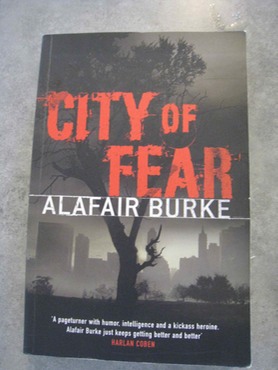Sunday, 21 June 2009
 Following shortly after the events in Dead Connection, Alafair Burke’s second Ellie Hatcher story, City of Fear, adds a few twists and turns in what will, hopefully, be an extended series.
Following shortly after the events in Dead Connection, Alafair Burke’s second Ellie Hatcher story, City of Fear, adds a few twists and turns in what will, hopefully, be an extended series.
One suspects a successful series of crime novels, particularly when you’re looking at the police procedural sub-genre really needs a set of characters that’ll allow the series to continue with a few personal twists and turns to intertwine with the vagaries of the plot line.
In Dead Connection we met Ellie Hatcher, her would-be rock star brother Jess and reporter Peter Morse, all of whom looked to have potential in the on-going series stakes. To them, City of Fear adds Ellie’s new professional/police partner J. J. Rogan, prosecutor Max Donovan and Ellie’s superior officer, Dan Eckels, all of whom have possibilities for the future, while reporter Peter Morse gets relegated to a second-tier role while he works on the writing project that’s supposed to put his name up in lights and may or may not feature Ellie. There’s one possible element for the third book in the series sitting right there.
Those characters intersect in various ways with the book’s main plot line, which begins with an unnamed stalker following Indiana student Chelsea Hart and her two friends, out, complete with fake IDs, for a big night in Manhattan's nightclubs before they head for home the following morning after their spring break. Chelsea stays on after the others head back to the hotel, and is discovered, dead, the next morning with substantial chunks of her long blonde hair hacked off.
Ellie Hatcher, half-way through the last morning run she’s going to manage for a while, is in the vicinity when the body is found, and as a result Ellie and Rogan get the case. Thanks to fairly painstaking forensic work and a substantial chunk of initiative on Ellie’s part, they manage to nail a suspect in reasonably quick time. In the current post-Global Financial Crisis environment it’s fitting that the suspect’s a hedge fund manager with several less-than-endearing yuppie friends.
But that’s halfway through the book, and predictably there are complications that set in.
Ellie becomes intrigued by the similarities between Chelsea’s death and a couple of cold cases dating back several years where the victims also had significant hair loss, and begins to suspect that things aren’t quite as clear as they once seemed.
Those misgivings aren’t the sort of thing that are likely to go down well with your colleagues in an overworked police force, particularly when the victim’s father has connections a fair way further up the New York municipal pecking order.
As the second half of the book unfolds, it becomes a matter of if not him, then who? and things get complicated further when the killer strikes again, and in a manner that brings Ellie more or less right in the cross-hairs.
Towards the end, the action unfolds rapidly and I found myself turning pages rapidly as events raced to their eventual conclusion. It’s another good read, and, in the end, offers plenty of possibilities for the next volume in what one hopes will develop into a substantial series.